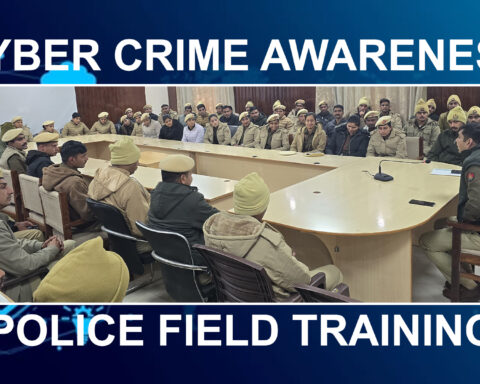Citizens Alerted on Rising Fake Job Scams in Cyber Space
Kaithal – In today’s digital age, almost every person uses a smartphone or computer. While this technology connects the world, it also gives rise to new threats. One such danger is cybercrime, which is increasing daily. People from all walks of life are becoming victims of online fraud.
SP Rajesh Kalia, the Superintendent of Police, has raised concern over growing cases of cyber fraud. In a recent public message, he warned people about a new scam on social media platforms. Scammers are offering fake part-time job offers to lure innocent users. These jobs seem easy and profitable, but they are traps.
How the Fraud Works
Cybercriminals offer part-time work that can be done in just 1–2 hours daily. They promise that users can earn thousands of rupees per day. At first glance, the offer looks tempting. Many people believe the messages and fall into the trap.
SP Kalia explained that scammers use SMS, WhatsApp, Telegram, and emails to reach people. They also use unknown websites and mobile apps. They send links asking people to click and share them with others. These messages also mention bonuses for forwarding the link.
This creates the illusion of quick income. However, the truth is that the scammers steal personal information through these links. Once users share data like phone numbers, IDs, or bank details, they risk losing their money.
Red Flags to Watch For
SP Kalia urged everyone to look for warning signs. No real job offers large payments for minimal work. He said, “Any offer that looks too good to be true is likely a scam.” He gave a list of things to avoid:
- Never click on unknown or suspicious links
- Do not share bank details or Aadhaar numbers online
- Avoid replying to strangers on WhatsApp or Telegram
- Do not trust anyone asking for money via mobile apps
- Do not install apps from unknown sources
These basic steps can help prevent major losses. People often lose their entire savings when they fall into such traps.
Fake Jobs: A New Tool of Cybercrime
The idea of working from home has become very popular. Many students, homemakers, and retired people look for part-time jobs. Scammers take advantage of this demand. They show images of bank transfers or fake testimonials to build trust.
Once the user joins, the scammer gives simple tasks like clicking links or giving reviews. Slowly, they ask for registration fees or processing charges. After collecting money, the scammer disappears.
In some cases, scammers even create fake job portals. These websites look professional but are designed to steal your identity. People lose money and also risk identity theft.
Role of the Police and Cyber Cells
SP Rajesh Kalia confirmed that local cybercrime units are tracking these scams. He advised that any suspicious message or call must be reported. People can also call helpline number 1930 if they become victims of online fraud.
The police are actively working with national cybercrime units. They are also training local teams to handle such complaints quickly. However, SP Kalia stressed that public awareness is the first line of defense.
He urged people to follow Cyber Dost on Twitter. The page shares real-time alerts and tips for staying safe online. Citizens can also visit the official portal cybercrime.gov.in to file complaints or learn more about threats.
Public Sentiment: Fear and Frustration
People across Kaithal have expressed growing concern. With rising online use, families feel exposed. Many have reported close calls with fraud. A college student said, “I was offered ₹4,000 a day for link sharing. It felt real. But I checked with my teacher and avoided a scam.”
Another senior citizen shared, “I lost ₹10,000 because I trusted a fake Telegram job. They even used official-sounding names. I felt cheated.”
These stories are common and highlight the need for stronger digital literacy. Citizens say more awareness campaigns must be run in rural and semi-urban areas.
How to Stay Safe from Cyber Scams
SP Kalia gave a checklist of cyber safety tips. These are easy to follow and can stop most online crimes:
- Do not click on unknown or suspicious links
- Never forward job-related messages from strangers
- Check the source of all job offers
- Avoid giving personal details to unknown people
- Use strong passwords for all digital accounts
- Do not send money to people without verification
- Update antivirus software on phones and computers
- Report any fraud immediately to your bank and the police
Even one mistake can cost a person their life savings. Awareness and caution are the best shields.
Appeal to Schools and Colleges
The police also urged educational institutions to take part in awareness. Workshops on cyber safety should be held in schools and colleges. Young people must be taught how online crime works.
Many fraud victims are students. They get attracted to easy money promises. But they end up losing personal data and face financial risk.
Parents must also talk to children about safe online habits. Setting digital limits and monitoring unknown contacts is helpful.
Conclusion: Your Safety Is in Your Hands
Cybercrime is becoming more advanced every day. But one thing remains true—no criminal can harm you without your mistake. SP Rajesh Kalia’s warning is timely and necessary.
Stay alert. Stay smart. Don’t trust shortcuts. Don’t share your data. And remember, if something feels wrong, it probably is.
If you ever doubt a message or call, call 1930. Visit cybercrime.gov.in. Or ask someone you trust. Together, we can create a safer digital space for all.


















